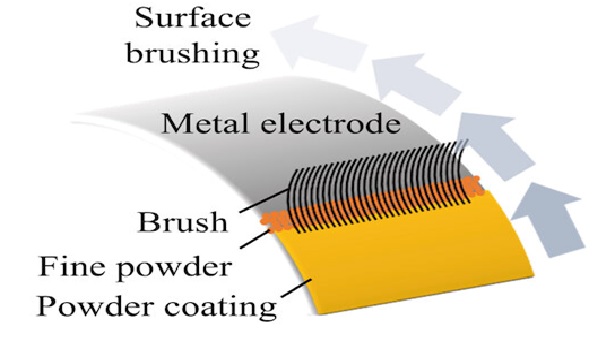Rice University found Brushing Thin Films onto Electrodes Preserves Batteries
The Rice University lab of chemist James Tour introduced a technique to tune the surface of anodes for batteries by simply brushing powders into them. The powder adheres to the anode and becomes a thin, lithiated coating that effectively prevents the formation of damaging dendrites.

Figure 1: Tune the surface of anodes for batteries by simply brushing powders into them.
Figure 1 shows that, powder of phosphorus and sulfur ground into the surface of lithium metal foil demonstrated its surface energy can be tuned without the need for toxic solvents. Anodes so modified and paired with lithium-iron-phosphate-oxide cathodes in test cells showed they retained 70% more capacity after 340 charge-discharge cycles than off-the-shelf batteries. [1]
Researchers built test batteries and determined that the treated anodes retained ultra-low polarization – another detrimental characteristic for lithium-ion batteries. for more than 4,000 hours, about eight times longer than bare lithium anodes.
Tour said the powders effectively regulate the surface energy of the electrodes, creating a more uniform behavior across the material.“This provides a metal composite surface that prevents the leakage of lithium metal from the anode, a common problem in lithium metal batteries,” said Tour. “Lithium metal batteries far exceed the capacity of traditional lithium-ion batteries. lithium, but metallic lithium is often difficult to recharge repeatedly.” [2]
“The powder on the lithium metal surface produces a synthetic passivation layer that improves the steadiness all through the charge-discharge cycles,” Chen stated. “Utilizing this brush-on technique, the steel floor is stabilized in order that it may be safely recharged.”
To point out the method might have wider software, the lab additionally floor powder right into a sodium electrode and found the method vastly stabilized its voltage overpotential.
The examiner aligns with the latest discovery by Tour and Rice mechanical engineer C. Fred Higgs III that sanding sure powders into surfaces could make them superhydrophobic, or extremely immune to water.
Co-authors of the paper are Rice alums John Li and Duy Luong; graduate college students Jacob Beckham, Nghi La and Jianan Xu, and tutorial customer Victor Li. Tour is the T.T. and W.F. Chao Chair in Chemistry in addition to a professor of laptop science and of materials science and nanoengineering at Rice. [3]
References:
- https://pedfire.com/brushing-thin-films-onto-electrodes-preserves-batteries/
- https://logictechworld.com/2022/08/22/brushing-the-thin-films-on-the-electrodes-preserves-the-batteries/
- https://dailyinformat.com/2022/08/22/brushing-thin-films-onto-electrodes-preserves-batteries/?utm_source=rss&utm_medium=rss&utm_campaign=brushing-thin-films-onto-electrodes-preserves-batteries
Cite this article:
Sri Vasagi K (2022), Rice University found Brushing Thin Films onto Electrodes Preserves Batteries, Anatechmaz, pp. 403

